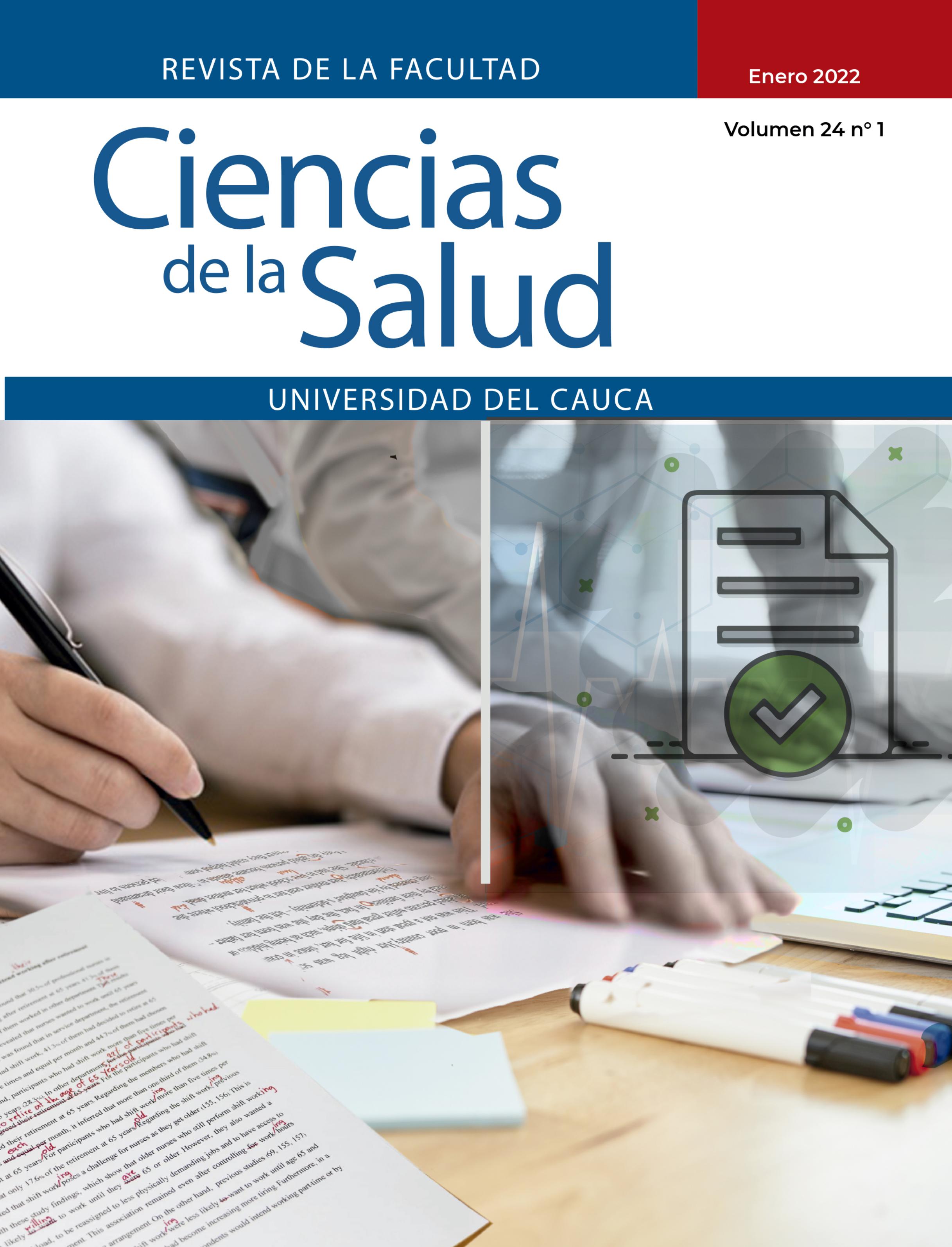Outpatient pharmacotherapeutic follow-up in hypertensive patients at a health center in Peru. Quasi-experimental study.
Abstract
Objective: To determine the impact of outpatient pharmacotherapeutic follow-up in hypertensive patients in a health center in northern Perú.
Methods: An explanatory, before-after longitudinal study was carried out in 36 adult patients with a diagnosis of HTN, who attend the Unión Health Center-Trujillo, through 9 home visits, using the DÁDER method that evaluates the pharmacotherapeutic follow-up. Four instruments were used to evaluate the following parameters: level of knowledge by means of a questionnaire, adherence to treatment using the Morisky-Green-Levine test, degree of patient satisfaction through the Purdue Pharmacist Directive test and monitoring of arterial hypertension values using a record sheet.
Results: For the level of knowledge, the questionnaire obtained an average score of 5.3 in the third visit and 10 in the ninth. For the degree of adherence, the test reached an average value of 1.9 in the second home visit, being considered non-adherent and 0.0 in the ninth visit, showing total adherence to pharmacological treatment. Regarding the test to determine the level of satisfaction towards the pharmaceutical chemist, the result was 85.7% and 100% during the fourth and ninth home visit, respectively. Significant results were found for the 3 quantitative parametric parameters, showing 100% adherence, satisfaction, and adequate level of knowledge at the end of the SFT. Regarding blood pressure values, it began with a mean of 138.6/87.1 mmHg, decreasing to 118.8/79.3 mmHg at the ninth home visit.
Conclusions: Pharmacotherapeutic follow-up had a favorable impact on the control of hypertensive patients.
Downloads
Disciplines:
Public healthReferences
Kokubo Y, Matsumoto C. Hypertension Is a Risk Factor for Several Types of Heart Disease: Review of Prospective Studies. Adv Exp Med Biol. 2017; 956: 419-426. https://doi.org/10.1007/5584_2016_99
Tagle R. Diagnóstico de hipertensión arterial. Rev.Med. Cli n. Condes. 2018; 29(1): 12-20. https://doi.org/10.1016/j.rmclc.2017.12.005
Gopar-Nieto R, Ezquerra-Osorio A, Chávez-Gómez NL, Manzur-Sandoval D, Raymundo-Martínez GIM. ¿Cómo tratar la hipertensión arterial sistémica? Estrategias de tratamiento actuales. Arch Cardiol Mex. 2021; 91(4): 493-499. https://doi.org/10.24875/acm.200003011
Williams B, Spiering W, Agabiti Rosei E, Azizi M, Burnier M, Clement D, et al. Guía ESC/ESH 2018 sobre el diagnóstico y tratamiento de la hipertensión arterial. Rev Esp Cardiol. 2019; 72(2): 160.e1-e78. https://doi.org/10.1016/j.recesp.10.1016/j.recesp.2018.11.022
Organización Mundial de la Salud. Hipertensión arterial [Internet]. Ginebra, Suiza: OMS; 2016 [Consultado; 22 de junio del 2021]. Disponible en: https://www.who.int/es/news-room/fact-sheets/detail/hypertension
Organización Mundial de la Salud. Información general sobre la hipertensión en el mundo [Internet]. Ginebra, Suiza: OMS; 2013 [Consultado; 22 de junio del 2021]. Disponible en: https://onx.la/945a0
Ministerio de Salud. Guía Técnica: Guía de práctica para el diagnóstico, tratamiento y control de la enfermedad hipertensiva [Internet]. Bogotá, Colombia: Minist Salud; 2015 [Consultado; 21 de junio del 2021]. Disponible en: https://www.saludarequipa.gob.pe/salud_personas/archivos/GPC2015/RM031-2015-MINSA
Banegas JR, Gijón-Conde T. Epidemiology of hypertension. Hipertens y Riesgo Vasc. 2017; 34(Supl 2): 2-4. https://doi.org/10.1016/s1889-1837(18)30066-7
Organización Panamericana de la Salud. Hipertensión [Internet]. Washington D. C., Estados Unidos: OPS; [Consultado; 22 de junio del 2021]. Disponible en: https://www.paho.org/es/temas/hipertension
Organización Mundial de la Salud. ¿Es la hipertensión un problema frecuente? [Internet]. Ginebra, Suiza: OMS; 2013 [Consultado; 22 de junio del 2021]. Disponible en: https://www.who.int/es/health-topics/hypertension#tab=tab_17
Organización Panamericana de la Salud. La OPS/OMS pide dar más atención al control de la hipertensión [Internet]. Washington DC, Estados Unidos: OPS; [Consultado; 22 de junio del 2021]. Disponible en: https://onx.la/b37cb
Instituto Nacional de Estadística e Informática. El 39,9% de peruanos de 15 y más años de edad tiene al menos una comorbilidad [Internet]. Lima, Perú. INEI; 2021 [Consultado; 23 de junio del 2021]. Disponible en: https://onx.la/72598
Gomez F, Camacho A, López J, López P. Control y tratamiento de la hipertensión arterial: Programa 20-20. Rev Col Cardiol. 2019; 2(26): 57-112. https://doi.org/10.1016/j.rccar.2018.06.008
Ballester R. Eficacia terapéutica de un programa de intervención grupal cognitivo-comportamental para mejorar la adhesión al tratamiento y el estado emocional de pacientes con infección por VIH/SIDA. Psicothema. 2003; 15(4): 517-523.
He W, Bonner A, Anderson D Patient reported adherence to hypertension treatment: A revalidation study. Eur J Cardiovasc Nurs. 2016; 15(2): 150-156. https://doi.org/10.1177%2F1474515115603902
Jankowska-Polańska B, Chudiak A, Uchmanowicz I, Dudek K, Mazur G. Selected factors affecting adherence in the pharmacological treatment of arterial hypertension. Patient Prefer Adherence. 2017; 1(11): 363-371. https://doi.org/10.2147/ppa.s127407
Villalva CM, Alvarez-Muiño XLL, Mondelo TG, Fachado AA, Fernández JC. Adherence to Treatment in Hypertension. Adv Exp Med Biol. 2017; 956: 129-147. https://doi.org/10.1007/5584_2016_77
Van der Laan DM, Elders PJM, Boons CCLM, Beckeringh JJ, Nijpels G, Hugtenburg JG. Factors associated with antihypertensive medication non-adherence: a systematic review. J Hum Hypertens. 2017; 31(11): 687-694. https://doi.org/10.1016/s0140-6736(18)30951-6
Burnier M, Egan BM. Adherence in Hypertension. Circ Res. 2019; 124(7): 1124-1140. https://doi.org/10.1161/circresaha.118.313220
Goienetxea E. Seguimiento farmacoterapéutico: competencia del farmacéutico. Farmacéuticos Comunitarios. 2017; 9(4): 14-17. https://doi.org/10.5672/FC.2173-9218.(2017/Vol9).004.03
Leyva Y, Torres ML, Guerrero A, Padilla I. Validación de la idoneidad de la prescripción médica en pacientes cardiópatas. Arch Cardiol Mex. 2021; 92(1): 75-84. https://doi.org/10.24875/ACM.20000418
Guarín GM, Pinilla AE. Adherencia al tratamiento antihipertensivo y su relación con la calidad de vida en pacientes de dos hospitales de Bogotá, D.C. 2013-2014. Rev. Fac. Med. 2016; 64(4): 651-7. http://dx.doi.org/10.15446/revfacmed.v64n4.52217
Caetano de Souza A, Pereira J, Magalhaes T. Quality of life and treatment adherence in hypertensive patients: systematic review with meta-analysis. Rev Saude Publica. 2016; 50: 71. https://doi.org/10.1590/s1518-8787.2016050006415
Castro J, Molineros L, Cruz L, Calderón M. Evaluación de la efectividad de una capacitación para el conocimiento de pacientes hipertensos. Revista Cubana de Salud Pública. 2018; 44(2): 291-301.
Pan American Health Organization, Organización Mundial de la Salud. Adherencia a los tratamientos a largo plazo. Pruebas para la acción [Internet]. Ginebra, Suiza: OMS; 2004 [Consultado; 21 de junio del 2021). Disponible en: https://iris.paho.org/handle/10665.2/41182
Aid J. Adherencia al tratamiento antihipertensivo en pacientes ambulatorios de un hospital urbano. Rev. Virtual Soc. Parag. Med. Int. 2015; 2(2): 43-51. https://doi.org/10.18004/rvspmi/2312-3893/2015.02(02)43-051
Armando P. Valoración de la satisfacción de los pacientes con el seguimiento farmacoterapeutico. Pharmacy practice. 2005; 3(4): 205-212.
Hernández R., Mendoza C. Metodología de la investigación: las tres rutas cuantitativa, cualitativa y mixta. 1° Ed. México: Mc Graw - Hill Interamericana; 2018.
Morisky DE, Green LW, Levine DM. Concurrent and predictive validity of a self-reported measure of medication adherence. Med Care. 1986; 24(1): 67-74. https://doi.org/10.1097/00005650-198601000-00007
Val A, Amorós G, Martínez P, Fernández ML, León M. Descriptive study of patient compliance in pharmacologic antihypertensive treatment and validation of the Morisky and Green test. Aten primaria. 1992; 10(5): 767-70.
Gupchup GV, Wolfgang AP, Thomas J 3rd. Development of a scale to measure directive guidance by pharmacists. Ann Pharmacother. 1996; 30(12): 1369-75. https://doi.org/10.1177/106002809603001201
Asociación Médica Mundial. Helsinki: Declaración de Helsinki de la AMM - Principios éticos para la investigación médica con seres humanos [Internet]. Ferney-Voltaire, Francia: WMA; 2017 [Consultado: 23 de junio del 2021]. Disponible en: https://onx.la/77519
Organización Panamericana de la Salud y Consejo de Organizaciones Internacionales de las Ciencias Médicas. Pautas éticas internacionales para la investigación relacionada con la salud con seres humanos [Internet]. Cuarta Edición. Ginebra, Suiza: Consejo de Organizaciones Internacionales de las Ciencias Médicas (CIOMS); 2016 [Consultado; 20 de junio del 2021]. Disponible en: https://iris.paho.org/handle/10665.2/34457
Rodríguez J, Solís R, Rogic S, Román Y, Reyes M. Asociación entre conocimiento de hipertensión arterial y adherencia al tratamiento en pacientes hipertensos del Hospital Nacional Edgardo Rebagliati Martins de Lima, Perú 2015. Rev. Fac. Med. 2017; 65(1): 55-60. http://dx.doi.org/10.15446/revfacmed.v65n1.56773
Benítez M, Egocheaga IM, Dalfó A, Bajo J, Vara L, Sanchis C, et al. Estudio Conocimiento: Grado de conocimiento sobre hipertensión arterial de nuestros pacientes. Relación con el nivel de control de la misma. Hipertens Riesgo Vasc. 2015; 32(1): 12-20. http://dx.doi.org/10.1016/j.hipert.2014.06.003
Ramírez V. La teoría del conocimiento en investigación científica: una visión actual. An. Fac. med. 2009; 70(3): 217-224. Pérez R, Rodríguez L. Nivel de conocimientos, sobre hipertensión arterial, de pacientes atendidos en un Centro de Diagnóstico Integral de Venezuela. Correo Científico Médico. 2015; 19(3): 406-417.
Sabaté E. Adherence To Long - Term Therapies, Evidence for action. World Health Organization. Switzerland: World Health Organization; 2003.
Reyes E, Trejo A, Arguijo S, Jímenez A, Castillo A, Hernández A, Mazzoni L. Adherencia Terapéutica: Conceptos, determinantes y nuevas estrategias. Rev Méd Hondur. 2016: 84(3/4): 125-132.
Morisky DE, Ang A, Krousel-Wood M, Ward HJ. Predictive validity of a medication adherence measure in an outpatient setting. J Clin Hypertens (Greenwich) 2008; 10(5): 348-54. https://doi.org/10.1111/j.1751-7176.2008.07572.x












.png)



